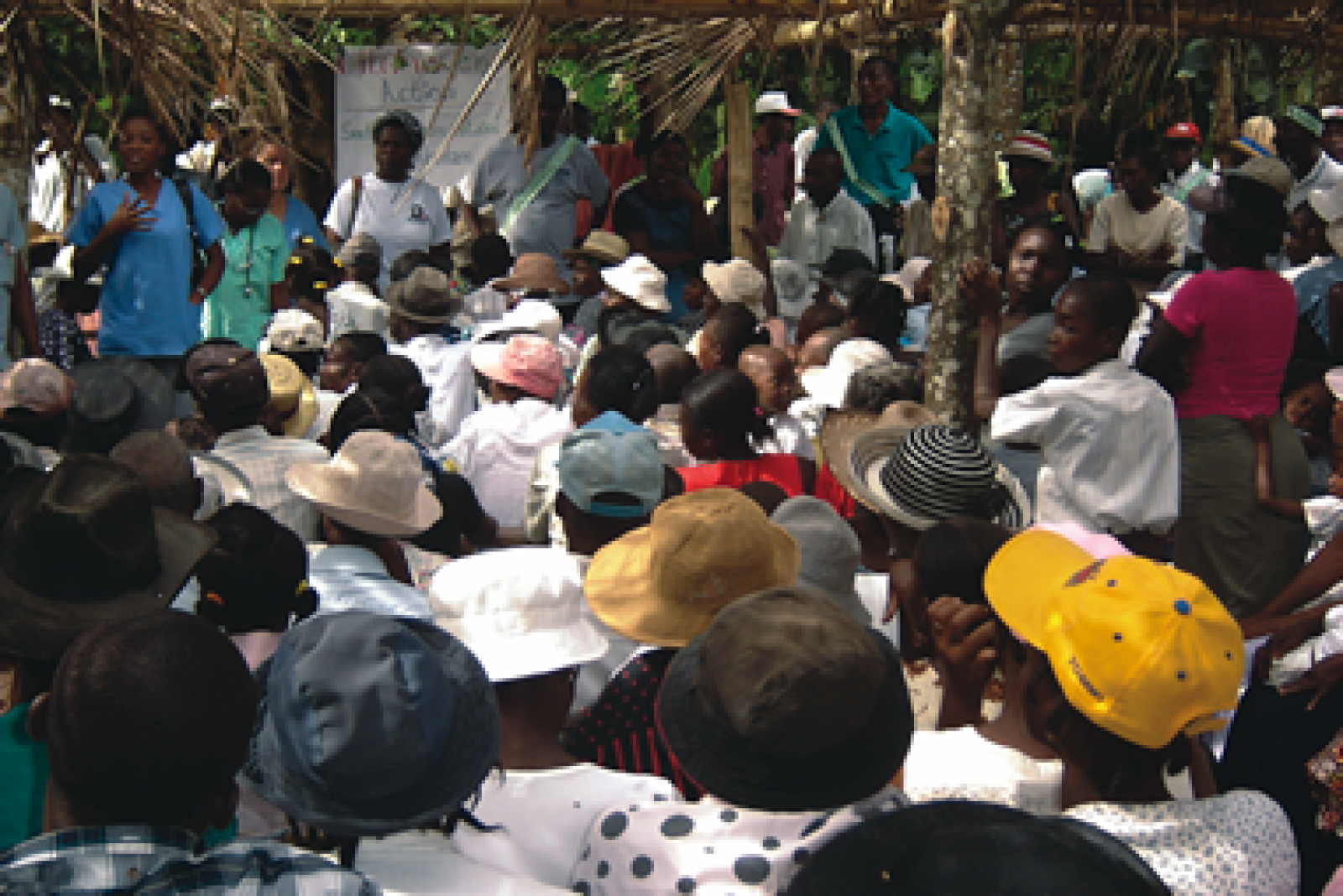
SHARE
Since the 1986 fall of the Duvalier dictatorship, Haiti has struggled as it moves toward democracy. The country is the poorest in the Western Hemisphere, and the public is frustrated with the limited degree of progress made in addressing issues such as poverty, public safety and corruption, which threaten the country’s political stability.
A bright spot in the last decade has been the creation of community action groups, known as Initiative Committees (ICs), which were established beginning in 2001, and are continuing to build bridges with government leaders in a variety of ways to improve community life. Action by more than 3,000 citizens across nearly 300 ICs has led to the building of health clinics, schools and roads; job-skills training; cholera prevention activities; HIV/AIDS education; and disaster relief efforts, among other projects.
Over the last year, the ICs, which were created with NDI assistance, have joined other civic groups to increase their impact as they advocate for government to improve life in their communities.
For example, an IC coalition in Haiti’s South department has worked to encourage government to develop tourism. Members of the local chamber of commerce, women’s groups, grassroots organizations and farmers’ associations came together in early 2012 to push for an airport expansion in the city of Les Cayes — which the government had declined to fund — to encourage tourism and support the region’s economy. The South Advocacy Coalition commissioned a paper on the feasibility and benefits of the project, worked with media to advocate for its position, and met with local and national politicians to press the issue. The paper was published in a leading national newspaper and the coalition collected more than 3,500 signatures on a petition of support. The government reversed its position on funding, allowing construction to begin. During a Feb. 1 ceremony, Prime Minister Laurent Lamothe laid the first brick of the new airport extension.
The South Coalition’s campaign brought together members of different segments of Haitian society who had rarely collaborated on projects in the past, including local mayors, members of parliament (MPs), ministry of tourism representatives, airport officials and the government’s departmental delegate, who were recognized at an event hosted by the coalition and broadcast on local TV and radio. At the event, the department delegate commended the coalition for its work encouraging government support for the airport expansion.
Over the next three years, members of the South Coalition will monitor how the project is carried out to ensure that construction continues and that the national government continues to devote the resources it has pledged.
Along the Haitian-Dominican border — where difficult relations between the two countries give local economic and public safety issues national importance — another group of ICs representing Haiti’s Northeast, Center, West and Southeast departments have organized a regional Border Advocacy Coalition to advocate with local and national officials to deal with such issues as violent crime, security risks for Haitian vendors in border markets who are often subject to violence or illegal confiscations by border authorities, and regional economic development.
The coalition, begun by members of local ICs, came together with the business community, local authorities, women’s organizations, religious leaders and other civil society representatives to create a 13-page “Border Declaration” outlining priorities, such as government funding for local development projects, including infrastructure development, and support for more police. The declaration has been presented to communities, MPs, civic groups and local media to gain feedback and support. The coalition has become a respected voice for citizens in the region and a resource for international organizations, such as the European Union (EU), that want community input on their development plans. For example, the branch of the Border Coalition in the city of Ouanaminthe has worked with EU representatives and local authorities on how to carry out EU projects that focus on issues such as food security and improving cross-border relations.
Additionally, as a result of the coalition’s work, MPs from the area have decided to form a parliamentary caucus on border issues. “We the deputies of the border regions will work together to pursue these [Border Declaration] proposals,” said Deputy Guerda Benjamin, an MP representing Savanette in the border region Center department. Benjamin has encouraged MPs from across the region to promote the declaration as a way to strengthen advocacy for more development funds for the border in the next budget.[1]
Read more:
- International Visitors Share Experiences on Organizing Debates
- Citizen Development Roadmaps Gain Lawmakers' Attention in Haiti
- NDI Calls on Haitian Presidential Candidates to Abide by Code of Conduct
Published May 22, 2013


